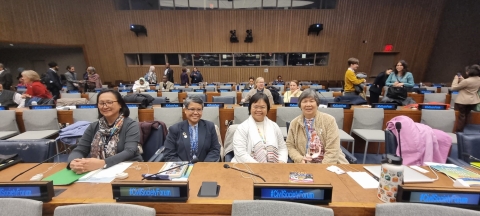
Maryknoll Sister Margaret Lacson reports some observations on the UN annual meetings to foster social development and justice.
The following article was published in the March-April 2024 issue of NewsNotes.
The 62nd Session of the Commission for Social Development (CSocD62) held from 5-14 February 2024 at the UN in New York, focused on fostering social development and justice to expedite progress on the 2030 Agenda and poverty eradication.
The Maryknoll Sisters were represented at the sessions by Sister Margaret Lacson, who shared her observations of the commission.
The 62nd session’s discussions were anchored around the urgent need for inclusive social policies that not only aim to eradicate poverty but also ensure that the benefits of digital transformation contribute to inclusive growth and development. This focus was particularly pertinent given the rapid pace of technological advancements and their implications for social justice. The commemoration of the 30th anniversary of the Year of the Family also provided a timely opportunity to reflect on the evolving concept of family within the context of social development.
The Maryknoll Sisters joined with other UN-accredited NGOS on the Committee for Social Development to prepare for the sessions. The committee’s efforts included a review of the implementation of the Copenhagen Declaration, drafting a Civil Society Declaration, and engagement with delegates from Member States to advocate for priority areas. The Civil Society Forum, held during the conference, provided the space for civil society groups to strategize on the session’s themes and engage in meaningful networking.
Last September, we shared the stark updates from the UN on the limited progress achieved so far on the Sustainable Development Goals. Midway to 2030, the Sustainable Development Goals of 2015 are woefully behind schedule. As of Fall 2023, only 12 percent of the targets on most of the goals had been reached and some goals had degraded. The lack of success is most evident in the state of global access to clean water and food and nutrition. Approximately 2.4 billion people are living in water stressed countries and an estimated 2.4 billion individuals, largely women and residents of rural areas, do not have consistent access to nutritious, safe, and sufficient food. The failure, the UN Secretary General said in 2023, was due to the lack of commitment of member states to live up to the promises they made in 2015, when they unanimously agreed to these goals. The central issue is the failure of nations to provide the funding they promised. The global situation, characterized by social inequalities, extreme poverty, gender disparities, economic instability, and environmental crises, underscored the urgency of the discussions at CSocD62.
Representatives of nation states and civil society at the CSocD62 emphasized the need for access to fundamental services such as healthcare, education, clean water, and sanitation, as well as the importance of decent jobs, labor rights, and universal, gender-responsive social protection.
High-level panel discussions delved into how social policies can become more effective in achieving inclusive, resilient, and equitable societies. Topics included the impact of digital transformation on social justice, good practices in promoting social development, and innovative solutions to social challenges. A special panel focused on the 30th anniversary of the International Year of the Family, exploring the role of families in social development.
The resolutions passed by the session reflected a strong commitment to strengthening solidarity, social inclusion, and cohesion. A draft resolution on promoting care and support systems for social development emphasized the need to recognize, reduce, and redistribute unpaid care work and improve the conditions of care and domestic workers.
NGO members of the Committee for Social Development were active participants in the CSocD62. The chairperson of the committee highlighted priority concerns and introduced the Civil Society Declaration during the opening session. Side events and the Civil Society Forum facilitated further discussion and collaboration among participants.
As the session concluded, the global community was reminded of the critical role of social policies in achieving the Sustainable Development Goals and the vision of a more equitable, inclusive, and just world. The session highlighted the need for universal social protection, decent jobs, and rights-based, gender-responsive policies. Resolutions passed included a focus on care support systems and a call for stronger solidarity and social cohesion for future sessions.
Photo from the 62nd Session of the Commission for Social Development in New York, NY. From left to right, Sister Janet Palafox, of the Institute of the Blessed Virgin Mary Loreto Sisters, Sister Mary Jane Caspillo, of the Medical Mission Sisters, Sister Marides Santos, of the Missionary Sisters Servants of the Holy Spirit, representing VIVAT International, and Sister Margaret Lacson, of the Maryknoll Sisters.
